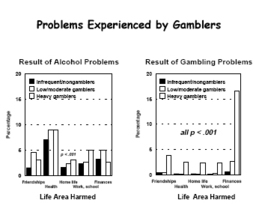A previous WAGER described the extent of substance abuse, measured in a variety of ways, among a sample of 2,016 randomly selected Ontario adult gamblers**. The results indicated that heavier gamblers did binge drink and smoke heavily significantly more than others (light/moderate gamblers, infrequent gamblers, or non-gamblers), but they were not detected to be more alcohol dependent. When asked about problems specific to alcohol or gambling behaviors, heavier gamblers reported more problems than respondents in the other groups. Specifically, heavier gamblers (spent $50 or more in the past 30 days on gambling) reported significantly more harm to their home life as a result of their alcohol consumption. Heavier gamblers also reported significantly more problems as a result of their gambling behaviors, including harm to their friendships, health, home life, work or school, and finances. About 17% (16.6%) of heavier gamblers reported harm to their finances in the last 12 months, compared with 2.6% of light or moderate gamblers and less than 1% of non gamblers. Financial problems as a result of gambling were the most prevalent area of harm among all respondents. Treatment providers and others in the helping professions should be trained to address specifically the financial problems of gamblers or learn how to refer them to the appropriate individual or agency for these services.

Sources: *Substance abuse among Ontario adult gamblers. (1997, April 22). The WAGER, 2(16), 1; **Smart, R.G., & Ferris, J. (1996). Alcohol, drugs and gambling in the Ontario adult population, 1994. Canadian Journal of Psychiatry, 41, 36-45.
This public education project is funded, in part, by The Andrews Foundation.
This fax may be copied without permission. Please cite The WAGER as the source.
For more information contact the Massachusetts Council on Compulsive Gambling, 190 High Street, Suite 6, Boston, MA 02110, U.S.




